
Viking Names
Skirbeck
Skirbeck, in the Skirbeck Wapentake of Lincolnshire, is a Scandinavian compound from Old Norse skírr ‘bright‘ and Old Norse bekkr ‘a stream, a beck’. These elements may have been replaced an Old English name formed from the elements scīr and bece. The stream is now dry, but in the nineteenth century it was asserted that the stream could be traced with little difficulty.
Read More

Viking Names
Torksey
Torksey, in the Lawress Wapentake of Lincolnshire, is a difficult name. The second element is Old English eg ‘an island, dry ground in fen, raised land in wet area’, but the first element, though apparently a personal name, is hard to interpret. The most plausible suggestion is that it is the Old English male personal name Turoc. The Anglo-Saxon Chronicle for the year 872 records that Her nam se here winter setle. æt Turces ige ‘And it [the Great Heathen Army] took winter-quarters at Torksey in Lindsey, and then the Mercians made peace with the host’. Recent excavations and other archaeological finds at Torksey are helping to build up our understanding of what that here was and what it did during the winter of 872-3.
Read More

Viking Names
Normanton
Normanton, in the Repton and Gresley Hundred in Derbyshire, takes its name from the Old English ethnonym Norðman ‘Northman, Norwegian’ and the Old English element tun ‘farm, settlement’. There are several places of this name, predominantly in the East Midlands: five in Nottinghamshire, and some in Derbyshire, Leicestershire, Lincolnshire and Rutland, and one in the West Riding of Yorkshire. Traditionally, the place-name has been interpreted as referring to a settlement of Norwegians (in an area where most of the Scandinavian settlers were Danes). However, the exact implications of such a name are not yet fully understood and are the subject of ongoing work by Dr Jayne Carroll of the Institute for Name-Studies, University of Nottingham.
Read More
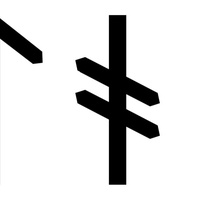
Viking Names
Slodi
Slóði was originally a byname meaning ‘lazy one’. It is extremely rare in West Scandinavia, recorded only once as a personal name and once as a byname and potentially found in a place-name. It is recorded a few times in runic inscriptions in Sweden. Slóði may be the first element in the place-name Sloothby, Lincolnshire; however, there are several other possibilities for this element.
Read More
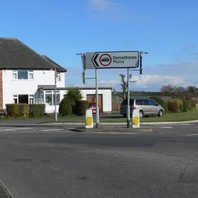
Viking Names
Donisthorpe
Donisthorpe, historically belonging to the Repton and Gresley Hundred of Derbyshire, comes from the Norman male personal name Durand (Middle English genitive singular Durandes) and the Old Norse element þorp ‘outlying farm, settlement’. Place-names containing þorp are thought to be later names, or at least rather longer lived, than those containing the Old Norse element by ‘farm, settlement’ because there are more instances of post-Conquest-type elements combined with þorp than by. Donisthorpe is an example of one of these place-names. Donisthorpe is a joint parish with Oakthorpe and they were both transferred to Leicestershire in 1897. These place-names are close in proximity to Boothorpe and Osgathorpe in Leicestershire demonstrating the density of the Old Norse element þorp across the medieval and modern landscape.
Read More
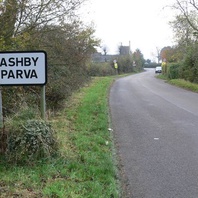
Viking Names
Ashby Parva
Ashby Parva, in the Guthlaxton Hundred of Leicestershire, is an Anglo-Scandinavian hybrid from Old English æsc ‘ash-tree’ and Old Norse by ‘a farmstead, a village’. There may have also been possible influence on the first element from Old Norse eski ‘a place growing with ash-tree’ or Old English esce ‘a stand of ash-trees’. Affixes such as the Medieval Latin parva ‘small’ and Middle English litel ‘little’ were variously added to different forms of the name to avoid confusion with nearby Ashby Magna.
Read More
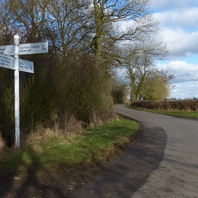
Viking Names
Carlton Curlieu
Carlton Curlieu, in the Gartree Hundred of Leicestershire, is a partly Scandinavianized form of Old English Ceorlenatun, from Old English ceorl (ceorlena genitive plural, Old Norse karl, genitive plural karla) ‘a freeman of the lower class, a peasant’ combined with Old English tun ‘an enclosure; a farmstead; a village; an estate’. The feudal affix Curlieu is the family name of William de Curley who held the manor in 1253.
Read More
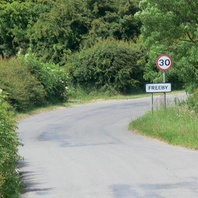
Viking Names
Freeby
Freeby, in the Framland Hundred of Leicestershire, comes from the Old Danish male personal name Fræði (genitive singular Frætha) combined with the Old Norse element by ‘a farmstead, a village’.
Read More

Viking Names
Sysonby
Sysonby, in the Framland Hundred of Leicestershire, comes from the Old Norse male personal name Sigsteinn (Middle English genitive singular Sigsteines) and Old Norse by ‘a farmstead, a village’.
Read More
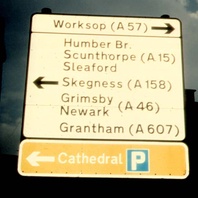
Viking Names
Great Grimsby
Great Grimsby, in the Bradley Wapentake of Lincolnshire, which was later joined with Haverstoe Wapentake to become known as Bradley Haverstoe Wapentake. The original name Grimsby comes from the Old Norse male personal name Grímr and the Old Norse element by ‘farm, settlement’. It is Great in contrast to Little Grimsby, in the Ludborough Wapentake of Lincolnshire; earlier spellings including mekill Grimesby are derived from Old Norse mikill ‘great’. The personal name Grímr is common across the Scandinavian world and recorded several times throughout Lincolnshire in the Domesday Book. For a saga-anecdote about Grimsby, see the blog post A Poet Visits Grimsby.
Read More
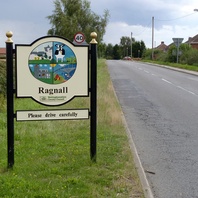
Viking Names
Ragnall
Ragnall, in the Bassetlaw Wapentake of Nottinghamshire, is a hybrid name formed from the Old Norse male personal name Ragni and the Old English element hyll ‘a hill, a natural eminence or elevated piece of ground’.
